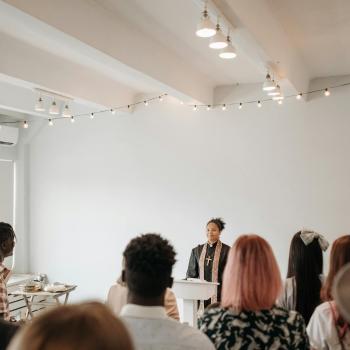A Serious Question about the Meaning of “Transgender”
I think everyone would be helped by a better, clearer understanding of what people mean when they say they are “transgender” and when non-transgender people talk about the phenomenon of what I will call (to coin a word) “transgendering.” (One person here has corrected my language—as happens frequently when stepping onto ground protected by the “PC police”—and informed me the correct term is “transitioning.” That term, however, is too vague, too applicable to too many processes, to be useful in this conversation. So I will use “transgendering.”)
For years I have heard (and read) people claim “I was born in the wrong body.” For years I have heard (and read) defenders of special protective rights for transgender people agree. I have been asked here and elsewhere whether I do or do not understand that some people are “born in the wrong body.”
Most of the people I know who defend transgender people as having a legitimate difference—from other people—deserving of special acknowledgment and protection—also believe “sex” and “gender” are two different things. “Sex” is defined by one’s biology and physiology (including especially DNA if we want to get down to the deepest biological level). “Gender” is, they say, a social construction not tied or connected to biology.
Before the relatively recent public discussion of the phenomenon of transgender and “gender reassignment,” many males and females expressed a desire to be the other sex and gender. During my lifetime I have known females who said they wish they were males and males who said they wish they were females. Many of them dressed like and wore their hair like the other sex. But until recently they did not claim to be the other sex or gender.
Now, in recent decades, with the growing social acknowledgment of a difference between “sex” and “gender,” people have come to talk about “gender reassignment” (in preference to “sex change”). Now one often hears people say “I identify as” a man or a woman when, in fact, their DNA and physiology is the other. When they are asked why, they often say “I was born in the wrong body.” (The same language is often heard from people who defend transgendering people as deserving of special protective rights—that they were “born in the wrong body.”)
So, it is now not uncommon to hear or read that a biologically and physiologically male person “identifies as a woman” and that a biologically and physiologically female person “identifies as a man.” (The words “girl” and “boy” could be substituted in those phrases as the phenomenon occurs increasingly among children and youth.)
The main argument defending transgender people’s rights, that society ought to accommodate them with special protections, including health insurance paying for their hormone shots, if that is the route they decide to take, and including government and corporate policies defending their right to use the restrooms and locker rooms that correspond with their “gender identity,” is that many of these people, perhaps all of them, were “born in the wrong body.”
It seems to me that acknowledging that some people are, indeed, “born in the wrong body,” logically requires the acknowledger to admit that gender is something other than social conditioning. This puts many of them on the horns of a dilemma and calls for explanation.
Being “born in the wrong body” (however described) with regard to gender and sex (wrong sex, right gender) must mean that gender is not merely socially conditioned and assigned. And yet, much of the conversation about the transgender phenomenon seems to include defense of it as a real phenomenon—not rooted in imagination or mental illness or personality disorder or preference—by people who have been arguing for many years that “gender” is socially and culturally created.
It seems to me, and this is the one and only point I am making here, that insofar as (pay attention to that phrase!) one believes that “gender” is socially constructed and not tied somehow to birth/biology/physiology he or she must reject the claim of those who say they were “born in the wrong body” (whatever precise wording they may choose for that) or admit the existence of a gendered soul (whatever precise wording they may choose for that entity).
Hear and reflect on the claim “I was born in the wrong body.” To what does the “I” refer?
Now, if the claim is not “I was born in the wrong body” but simply “I prefer to identify as the other sex even though my sex is biologically male [or female]” the issue I am raising disappears as a problem. Then it isn’t. Such a claim does not require belief that gender and sex are inextricably linked or belief in a non-material soul-like entity. However, that is not the language most transgender people (and their advocates) use; they insist that they were “born in the wrong body.” People who do not believe in anything like a non-material “soul” and/or believe that gender is only socially and culturally created and conditioned, ought to correct those who say “I was born in the wrong body” and tell them that they simply prefer, for whatever reason, to be the other sex or gender.
So why does that rarely happen? I have actually never heard it done or said in this particular conversation—about whether transgender people deserve special protective rights (e.g., to use the restroom or locker room of their choice). I suspect, although I am open to correction, that the reason is because “I was born in the wrong body” is a much stronger claim than “I prefer to identify as the other sex [than the one stated on my birth certificate at birth].” The latter claim is weaker because many people “prefer” to be something else than they always have been and were born as. As a body politic we do not usually acknowledge such preferences as worthy of special status and protective rights under the law.
Normally, the body politic dimension of society extends special protective rights only to people who, for whatever reason, cannot help what they are and what they are constitutes some kind of disability or disadvantage they cannot overcome. Either they were “born that way” or something has happened to them they cannot help (e.g., an accident or illness). Normally, the body politic does not extend special protective rights to people just because they have a preference to be something.
For example, a person who has a passion for American Indian/Native American culture and decides to “identify as” that would not become eligible for tribal membership and the benefits (federal reparations funding) that can sometimes entail. (Don’t argue with me about this; I personally know American Indians/Native Americas who have received such benefits and I support their receiving them. My belief is that we owe them much, but that is not the point of this blog post and I will not approve comments about it.)
For another example: I know a man who for many years states that he prefers to dress like a woman and wear his hair like a woman even in public. He has adopted many mannerisms commonly associated, culturally, with being feminine. However, he also vehemently denies being transgender or gay. He argues that he is a male and a man and does not regret that. Everyone would say that he has a preference. Few would argue that his cross-dressing preference deserves special protective rights other than the rights everyone has—not to be harassed or assaulted. He does not claim that he was “born this way;” he does not attempt to explain how his lifestyle came about. “It is what it is.”
Now, should that man say “Because I have this preference society must change to accommodate it” most people would not be impressed by that claim. There are already laws in place to protect him—like anyone—from assault or harassment. What if, on the basis solely of his preferred lifestyle, he and others like him lobbied for laws and/or public policies to, for example, require women’s hair stylists to style his hair? What if, on the basis solely of his preferred lifestyle, he and others like him lobbied for laws and/or public policies to, for example, allow him to use women’s changing rooms to try on clothes in stores such as “Victoria’s Secret?” Perhaps some would advocate for such rights, but I suspect most people would not—because his lifestyle is simply a preference and not something he cannot help.
Now, those examples, illustrations, are only meant to point out one thing that seems apparent to me: As a society, our body politic normally does not create special laws and policies to give special protective rights to people who only have a preference that occasionally, in certain places, causes them some distress such as not being able to access a facility. Normally, we, as a body politic, extend special protective rights to people who truly cannot help what they are. In other words, they have a “condition” (no value judgment implied) that is more than a mere “preference for a lifestyle.”
Now, my sole point here, in this post (pay attention!) is to argue that people who believe that transgender people deserve special (named) protective rights must—whether consciously or unconsciously–believe that “gender” is more, or other than, a social construction and that gendered souls (or whatever word for that “I” they prefer) exist that are not reducible to biology/physiology. And I wish to argue that many (not necessarily all) people in this conversation fall into inconsistency with themselves, between their beliefs. They need to think about that and, if they expect to be taken seriously, either adjust their beliefs or explain how they are not logically inconsistent with each other.
Note to potential commenters: I will not post comments here that constitute “flames,” use inflammatory words or vulgarities, go off the specific topic of the post, or misrepresent the points of the post. If you are not sure you “get it” (viz., what I am asking and arguing), don’t bother to respond with a comment; ask a question for clarification. Hostile, argumentative comments (and questions) and mere assertions will not be posted. The purpose of this blog is for me to present my thoughts and questions and to engage in constructive dialogue with those who are curious, seeking information or insight, and/or wish to engage in constructive, respectful agreement or disagreement. Others are welcome to read, but they are not welcome to participate in the conversation.















